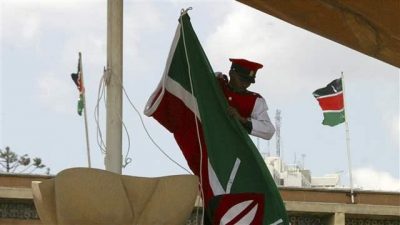By
Joe Khamisi
A few weeks ago in America, I flew from Charleston, North Carolina, to Dallas, Texas, with a stop-over in Atlanta, Georgia. Before the plane left the parking bay at Atlanta airport, the pilot came on the intercom to announce a brief delay in departure.
At that moment I looked through the window and saw a casket, draped in the American flag, being wheeled into the belly of the plane. Next to the casket was a lone marine in full ceremonial uniform, his hand raised in an honour salute. Nearby, a government official, stoic, in a black suit.
The two were escorting the soldier, killed in action overseas, to his home in Texas.
As the plane approached its destination at Dallas Fort Worth airport, the pilot came on the radio; this time to tell passengers to stay put in their seats until the casket had left the plane. “We are doing this in honour of a fallen soldier, and as a show of respect for the family on board,” he said in a sorrowful voice.
To meet the casket on the airport tarmac were a number of his fellow marines, several black limos and half a dozen police cars with lights flashing, ready to chaperone the body to its destination
It was only after the body was removed from the aircraft and loaded into a well polished hearse that passengers were allowed to disembark.
This, my dear Kenyans, is how America honours its dead soldiers; with lots of respect, honour, dignity, and decorum.
The reason I am telling you this story is because I was spurred by rage when I saw the bodies of Kenyan policemen piled on top of each other in a land cruiser, like bags of charcoal, their faces bloodied, their uniforms soiled. The bodies were being moved from the area of ambush in the north of Kenya to a mortuary.
The officers were accorded no respect, no honour, no privacy. Not even the “luxury” of a body bag or a service hearse. They were just there in an open jeep, lonely and uncared.
Most of us have seen in newspapers pictures of common criminals dumped in police vehicles in a similar way. The difference is that the people I am talking about were not thugs. They were our gallant sons who offered their lives so that we may live in peace.
More than 20 of them fell at Kapedo, their repeated calls for reinforcements ignored. For thirty hours they pleaded with higher ups to send back-up support but nobody responded.
If there is one case of negligence that requires an independent investigation, this is it.
You can bet that at the funerals, government officials and politicians will be there to deliver long, winding, speeches. Some will even make lofty promises of financial support to the families. That support – as we have seen in many instances before – will never come.
Most likely there will be a gun salute and shells will reverberate through the desolate dusty, landscape of the north. Once a burial is over, leaders will get into their four-wheel guzzlers and return to their luxury homes leaving the parents to ponder the future without their sons, brothers and uncles.
Our policemen are some of the most poorly paid workers in Kenya. Most of them live in horrible conditions. They are also some of the most ill-equipped, as we saw last week.
That is why I believe our men and women in uniform deserve better, not only in life, but also in death.



No Comments Yet!
You can be first to comment this post!